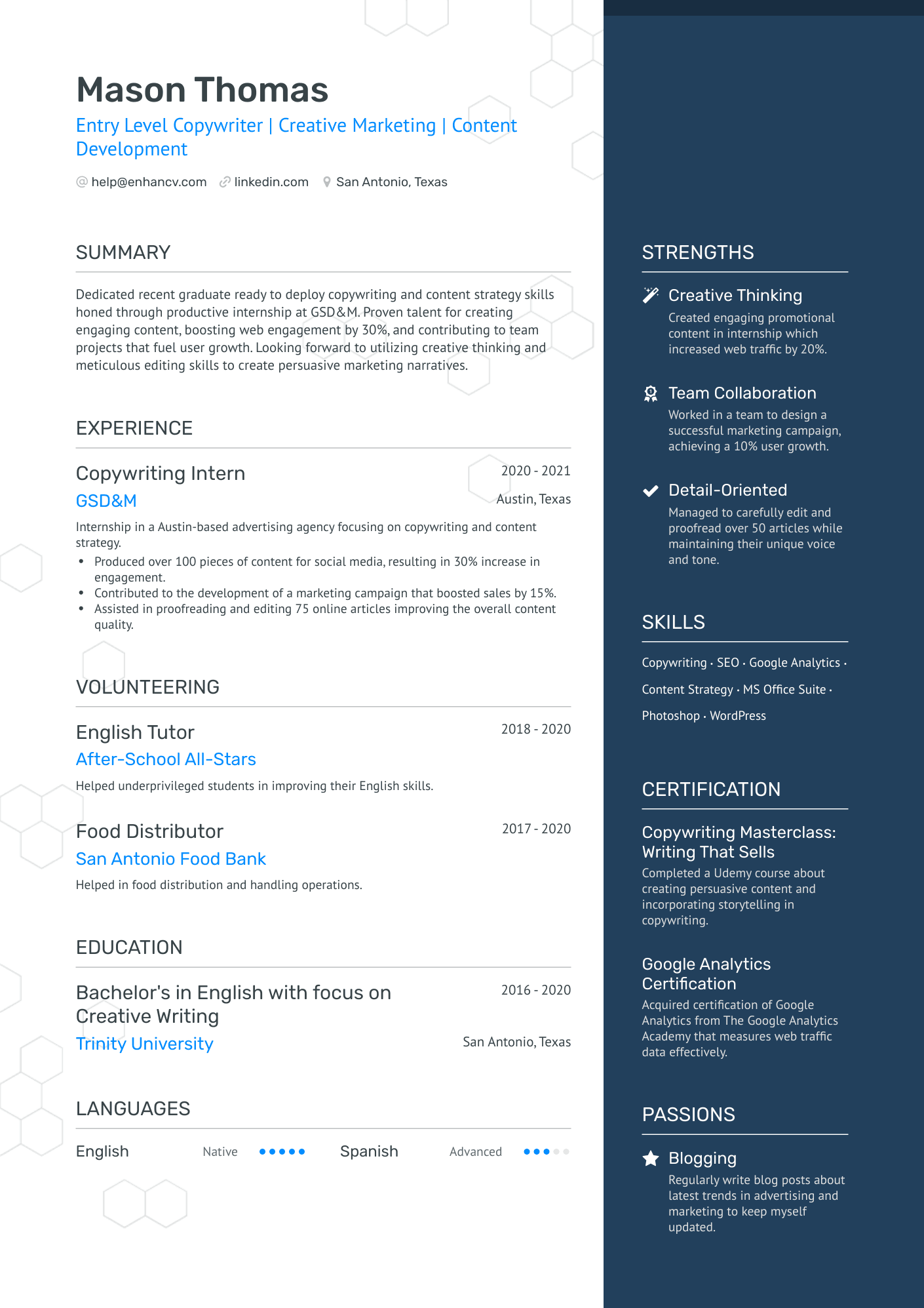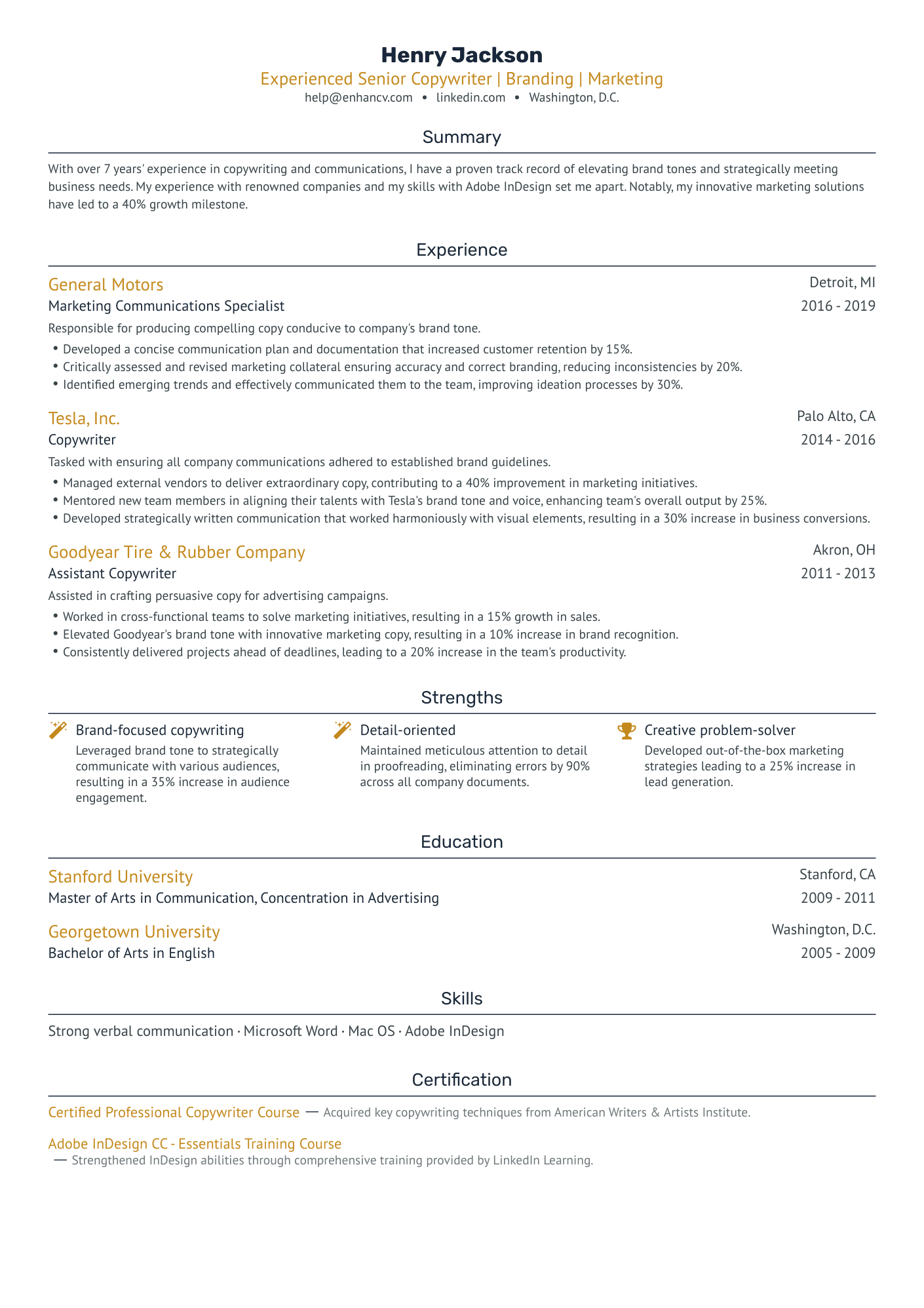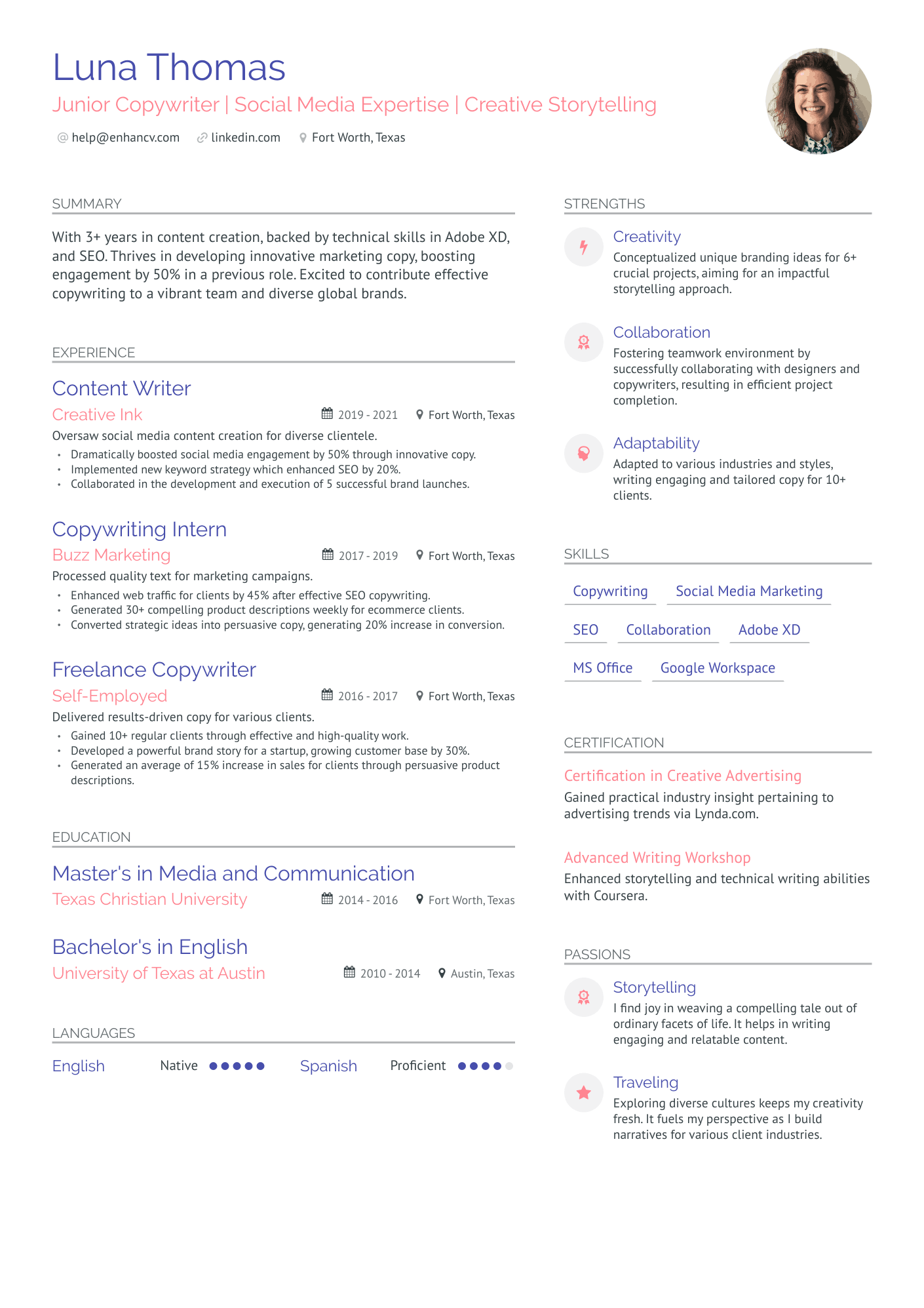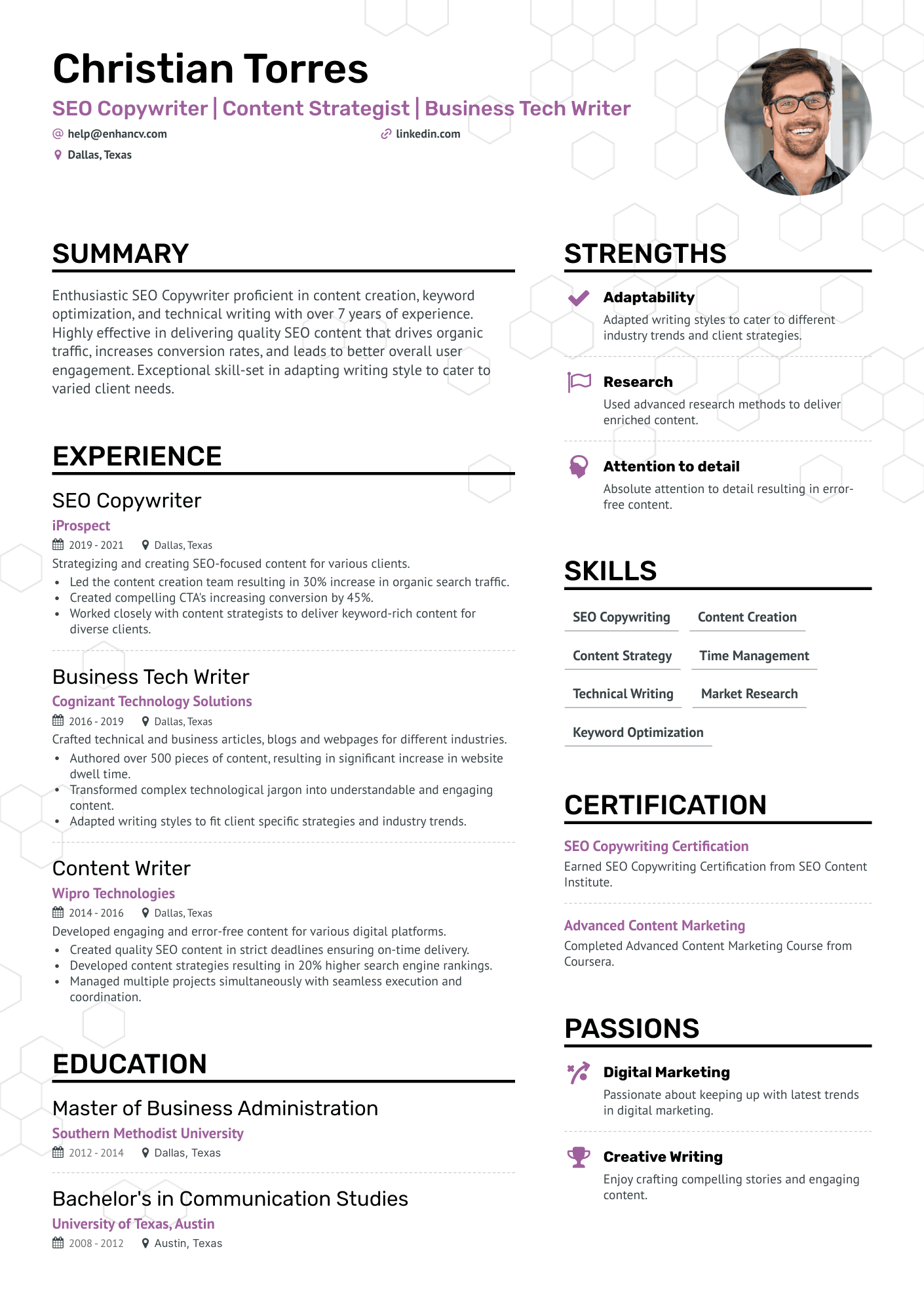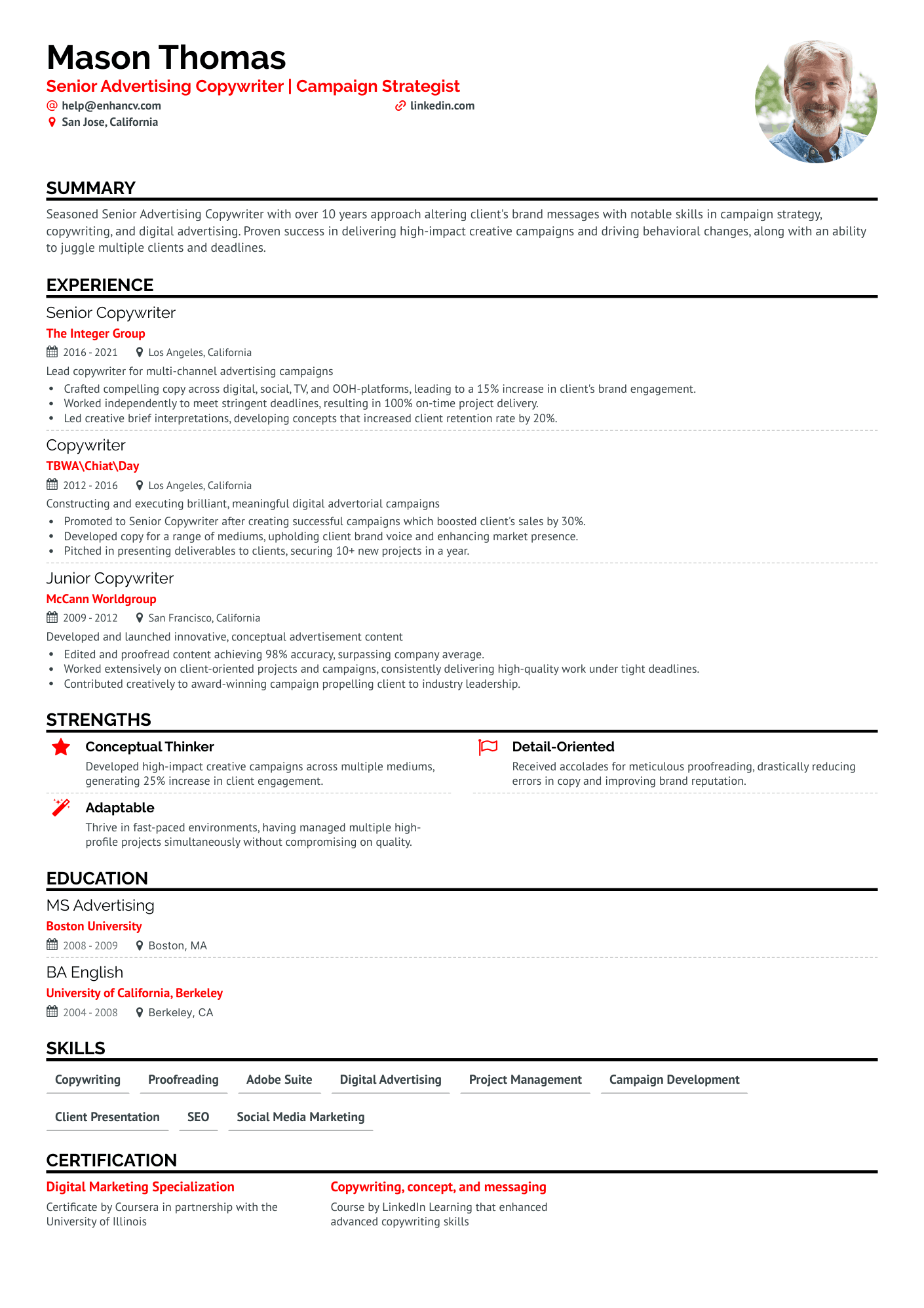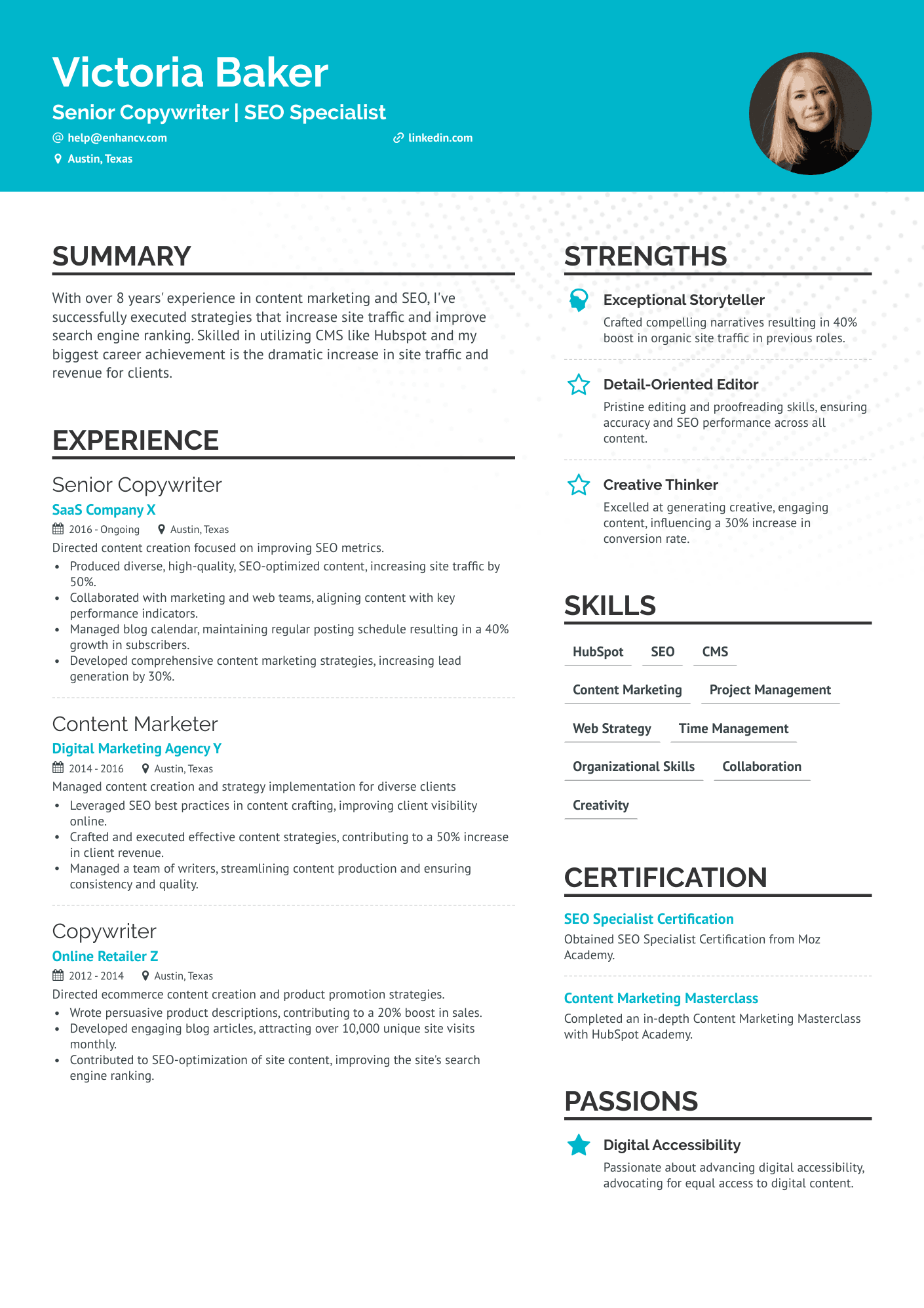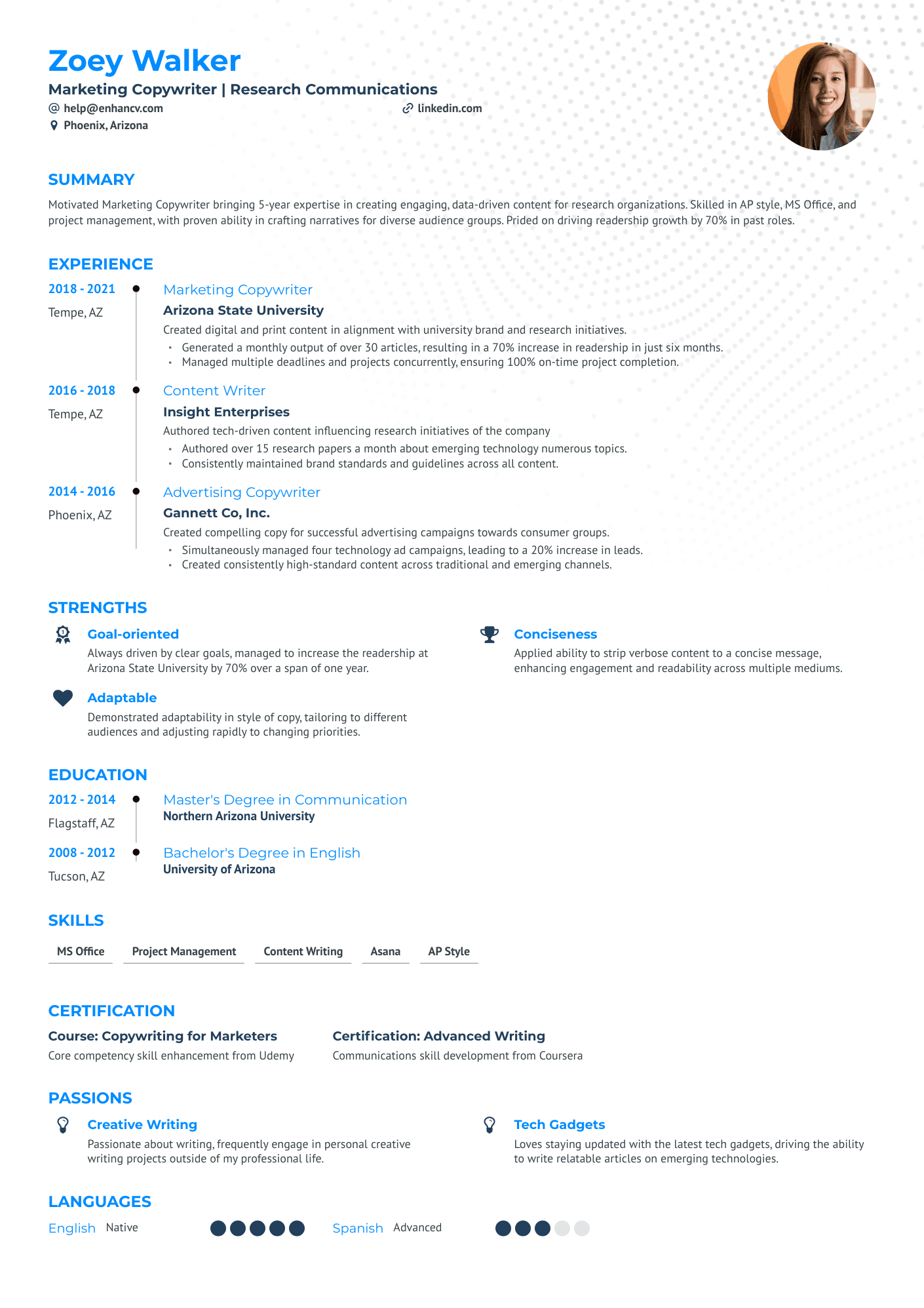Since the rise of ChatGPT and other AI writing services, there’s a ton of fear-mongering going around that AI is going to replace copywriters.
But years have passed since ChatGPT’s debut and great copywriters are still raking in the big dough. In fact, Google’s March 2024 algorithm update aims to take downlow-quality AI content by 40%.
Besides, as a copywriter, you don’t just write for search engines. Your words inform, persuade, and compel people to act. Just like your copy, every line and every bullet on your copywriter resume should pack a mean punch. Strong enough to convince the hiring team to give you a call.
If you’re getting lowball offers or just no replies at all, it might be time to toss out your old copywriter resume and go back to the drawing board for a full rewrite.
This guide will help you:
- To pick the best hard and soft copywriting skills that prove you’re the right fit for the job.
- Write jaw-dropping achievements on your work history to show everyone that you’re not just a fancy wordsmith, you can bring home the bacon too.
- To beef up your resume even if you have no formal copywriting experience yet.
- To include a comprehensive yet not-so-long portfolio on your copywriting resume.
How to format a copywriter resume
Every copywriter knows a long block of text isn’t a good copy, whether it’s for websites, emails, or even long sales letters. You need white space and good font placement to make sure the right words stand out. The same holds for your copywriter's resume.
You see recruiters no longer read resumes cover to cover. They use an Applicant Tracking System (ATS) to pre-screen applications. It only recognizes popular resume formats to parse a resume’s data into the system correctly, so don’t get too artsy on your resume.
Use a reverse-chronological format for your resume, and separate full-time and project-based work into two sections to avoid confusing recruiters with overlapping dates.
Here are a few more things to remember for your copywriter resume format:
- Link to your portfolio and professional social media handles in your header
- Write a catchy resume headline that describes your copywriting specialty.
- Include your phone and updated email address in the heading.
- Divide your resume with section headings that stand out.
- Allow plenty of whitespace in between headings and margins.
- Pick an easy-to-read typeface like Arial, Montserrat, or Volkhov.
- Use hyperlinks whenever applicable to link to specific examples of your copy, so recruiters can see your best works even if they don’t scroll through pages of your portfolio.
After that, go ahead and upload your resume on our checker below to see how it compares with other applicants. This will tell you what else you need to improve on your copywriter resume.
Is your resume good enough?
Drop your resume here or choose a file. PDF & DOCX only. Max 2MB file size.
Here’s a list of every major section a recruiter will expect to see on your copywriter resume:
The top sections on a copywriter resume:
- Contact information: This is essential for allowing employers or clients to reach the copywriter for further discussion or hiring.
- Professional summary: This section lets the copywriter highlight their years of experience, skills, and top achievements quickly.
- Copywriting experience: It provides detailed information about the applicant’s market specialty, the type of copy they write, and their track record.
- Skills and proficiencies: Here’s where you can itemize the specific media you wrote for, research skills, and other non-writing talents like keyword research, content strategy, or conversion rate optimization.
- Education and certifications: While not always necessary, formal education or certifications can showcase a commitment to learning and professionalism in the field of copywriting.
Recruiters will only scan your resume for a few seconds, so it’s important that they instantly see these qualities on your resume quickly.
What recruiters want to see on your resume:
- Proven writing skills: Recruiters will prioritize this, as excellent writing ability is crucial for creating compelling content and meeting client needs in the copywriting field.
- Portfolio of work: A strong portfolio can showcase the copywriter's ability to write across different mediums and styles, which is why recruiters will check the quality of your portfolio
- SEO knowledge: Understanding SEO is essential for online copywriting to enhance the visibility and reach of content, hence its high regard by recruiters.
- Creativity: This trait is prioritized because it enables copywriters to craft unique, original content that can attract and engage audiences.
- Adaptability: Because copywriting often involves working on varied projects, recruiters value candidates who can adapt their writing style to different client needs and industries.
A word about the Applicant Tracking System (ATS)
The ATS is a search engine, where recruiters type skills like website copywriting, brand identity creation, or market research. Then it searches their database for applications with the right keywords and ranks them accordingly. That’s why you must read the whole job ad and match the experience and skills listed with those on your resume.
Let’s get this straight though— the ATS doesn’t decide who gets an interview or not. It’s just the first hoop you need to jump through to land a job.
How to write your copywriter resume experience
The copywriter experience or work history section is the bulk of your resume because it lists your previous roles and achievements. Each item should also include the name of your employer, the start and end dates of your contract, and the job title.
While you need to include the tasks for each job, you shouldn’t list them just to show what you can do. Prove how you helped the company with those tasks, e.g. more sales, and increased awareness and social views.
Pick 3 to 5 skills you’re best at and highlight them throughout your work history by listing specific and quantifiable achievements for each. SEO copywriters, for instance, can highlight skills like keyword research, blog post optimization, and content strategy. Meanwhile, direct response copywriters can highlight skills like FB ad creation or mention a specific industry like e-commerce email marketing.
Don’t bother listing every single task for your previous job either, because that will add unnecessary bulk to your copywriter resume. Just pick those listed on the job ad you’re applying for and some that highlight your most impressive achievements. For instance, if the job ad mentions lifecycle marketing, include customer retention campaigns you created, or email sequences you wrote to sell an upgrade.
Copywriters also collaborate with other departments like design, product, and even customer service, so mention the work you completed with other teams. This includes collaborating with the design team to create a product page or working with the customer service team to create a sales letter with customer testimonials.
List duties that show your leadership skills if you’re applying for a senior copywriter position. These can include:
- Heading a campaign from brainstorming to execution and completion.
- Creating ad and email copy templates junior copywriters can use for inspiration.
- Creating content briefs for blog posts and other content, that will then be passed on to other writers for completion.
- Copyediting and giving feedback on the first draft of the copy.
You now know how to write a copywriter experience section. Now compare these examples and see which grabs more attention.
- •Increased awareness of our pet food brands through social media marketing
- •Wrote and promoted several blog posts on our company blog and through partnerships with other pet blogs.
- •Collaborated with designers and SEO team to create product pages for our online shopping website.
- •Created brand voice and editorial guidelines resulting in a more cohesive brand presence across different media.
The first one is just blah, right? There’s no mention of results and no links to specific copywriting clips either. It doesn’t even mention the kind of blog posts and social media content they wrote.
- •Created a 90-day campaign on Facebook, IG, and Pinterest with a combination of posts and reels or videos, which brought a total of 2400 new followers.
- •Increased web traffic by 35% through a series of SEO-optimized blog posts that now rank on the first page of SERPs for our target keywords.
- •Increased local search traffic by 47% and online orders by 26% after optimizing product page copy in collaboration with SEO and design team.
- •Conducted extensive market and customer research to create abandoned cart, transactional, and loyalty email sequences that resulted in over $143,000 monthly sales (46% improvement).
- •Created brand voice and editorial guidelines junior copywriters follow to produce new blog posts and social media ads.
Now this next example is sure to get some eyeballs! It’s specific in terms of results generated (revenue and traffic) and even mentions the specific social media platforms and email types used.
The use of keywords like abandoned cart emails and SEO-optimized blog posts will further boost this applicant’s ranking in the ATS as well.
Read these guides if you want to know how to include self-employed work or temp work on your copywriter resume.
How to quantify the impact on your resume
Employers prize creativity in copywriters, but it’s not just about how extensive your vocabulary is, or how good you are at writing hooks and headlines. What they value even more are the results your creativity brings in.
Below are different key performance indicators (KPIs) employers look for in a great copywriter:
- Clickthrough rate (CTR) of marketing campaigns
- Cost per lead and cost per acquisition (CPA), especially in pay-per-click (PPC) ads
- Conversion rate of emails and website call-to-action buttons
- Shares and likes on social media posts
- Increased website traffic and rankings through SEO copywriting
- Sales generated from marketing campaigns
- Before and after copy revamp conversion rate increases
- Increased newsletter subscribers
Another KPI worth noting is bounce rate, or how fast a website visitor closes a webpage. High bounce rates for a product page mean the website copy isn’t effective for several reasons. It could be a mismatch between the ad and the contents of the page, or the page wasn’t informative or persuasive enough in the first place.
When writing about KPIs, mention a percentage increase (e.g. “28% increase in newsletter sign-ups”), thus proving your skills in lead generation. You can also use revenue, such as - “$12,000 increase sales from CTR on abandoned cart email sequence” - to showcase your persuasiveness and knowledge of email marketing tactics.
Read our guide for more information about writing numbers in resume.
How do I write a copywriter resume with no experience
Every single copywriter out there was once a beginner with no portfolio to their name. So with enough grit and creativity, you too can get a job as oneeven if you have no experience yet. This section will tell you how.
Sit down with a piece of paper and write down every writing experience you can think of. It doesn’t matter if you were paid for it or not, so long as you wrote something and gained some experience from it. You can even include transferable skills from subjects you studied or part-time and volunteer work. These transferable skills don’t need to be limited to writing either.
Ask yourself these questions to gather your writing and marketing experience:
- What degree do you have? What writing and marketing courses were there? Did you study psychology?
- What grades did you get from your English or writing-related course units?
- Were you part of your school newspaper team?
- Do you have a Facebook page or profile with a lot of views and followers?
- Do you write posts that get attention on Facebook, Twitter (X), or LinkedIn?
- Have you had an internship or volunteer role where you had to write articles, newsletters, or social media posts?
- Have you written or designed posters and ads for items you sold?
- Do you have a personal blog?
Answer these questions to get more insight into your transferable skills:
- Have you ever had a customer-facing role like sales or customer service? Knowing how to interact with prospects is important in copywriting.
- What are you passionate about? This helps if you’re passionate about the industry or product the employer is promoting.
- What jobs in your work history are relevant to the writing job you’re applying for? For instance, you might’ve worked at an auto shop before but now you can use that experience to write about cars and auto detailing.
Don’t ignore spec work. Spec work, in the writing world, means writing a minimal sample or outline without pay, to give employers a gauge of your word-slinging skills. Many agencies and publishers will request spec work from writers they don’t know or those with no portfolio— it’s a standard practice. So don’t just assume they’re out to scam you. Think of it as volunteering in exchange for clips on your portfolio.
Link to your spec work in your resume portfolio and include them in your work history too in a separate section for projects or one-off work. Include the instructions you were given for the job too, so employers will have context when grading your samples.
How to list your hard skills and soft skills on your resume
You need a good mix of hard and soft skills on your copywriter resume, so recruiters can see that you can write well as well as adapt to various audiences, trends, and copy formats.
Copywriter hard skills are specific to the job, like email marketing and video sales letter (VSL) writing. But hard skills aren’t just things you do, it can also include technical skills like software you know how to use such as ActiveCampaign and Hootsuite in the case of copywriters.
Best hard skills for your copywriter resume
- Search Engine Optimization (SEO)
- Content Management Systems (CMS)
- Google Analytics
- Social media management
- Paid search advertisements
- Email marketing software
- HTML
- CSS
- Copy editing
- Graphic design
- UX writing
- Conversion Rate Optimization (CRO)
- Keyword research
- Marketing automation tools
- Content strategy
- Direct response copywriting
- Press release writing
- Blog post writing
- Landing page creation
- Adobe Creative Suite
Meanwhile, soft skills help copywriters do their job well but their applications aren’t just for copywriting. Collaboration, time management, and receptivity to feedback are sought-after soft skills for copywriters because they enable them to work well with clients, creatives, and account executives.
Best soft skills for your copywriter resume
- Creativity
- Adaptability
- Attention to detail
- Time management
- Critical thinking
- Teamwork
- Research skills
- Problem-solving
- Self-motivation
- Patience
- Multitasking
- Relationship building
- Receptive to feedback
- Active listening
- Ability to work under pressure
- Decision making
It’s no good to just randomly list all your copywriter's skills and hope for the best. Read multiple job ads for your target role and identify 3 to 5 common skills then list them on your resume.
How to list your certifications and education on your resume
Listing your college degree isn’t complicated. If you have more than 3 years of experience, write your degree and major, plus any relevant minor subjects along with the school’s name and your graduation year.
If you’re just starting, include extra details like academic achievements, extra-curricular activities, relevant coursework, and the GPA if it’s 3.5 or higher.
It’s worth listing your field of study even if you don’t have an English or marketing degree, especially if you’re after niche work that requires technical know-how. A bachelor’s in accounting or mathematics, for example, will give you credibility when applying for finance copywriting roles.
Here’s how to list your education:
- •Cum Laude
- •Dean's List for 8 semesters
Read these guides for more information on how to list cum laude and dean’s list on your resume.
While copywriters aren’t required to get certifications, some employers look for copywriters with specific certifications. For instance, a marketing agency that uses Hubspot for their clients would prefer a writer who knows how to use Hubspot’s CRM and email marketing tools. The same goes for clients that offer SEO. They will prefer writers who know how to use Google Analytics or Ahrefs.
Some employers prefer to get writers who have taken certain courses because they know the quality of teaching in said course. Here’s how to list certifications on your resume:
Below are the most recognized copywriting certifications right now:
Best certifications for your copywriter resume
How to write your copywriter resume summary or objective
Like a headline, a resume summary or objective is the first thing recruiters will see on your resume. First impressions are powerful, so make it count.
Experienced candidates use a resume summary to give an overview of their accomplishments, while inexperienced candidates use the resume objective to show how skills from their previous work are transferable and how they’ll benefit employers. Whether you go with a resume summary or objective, make it snappy—like a good hook that draws people in.
We probably don’t need to tell you how to write a good copywriter resume summary or objective, but here are a few pointers just in case:
- Less is more - Keep your statement within 3 to 5 sentences. The summary is there to entice people to read more, not to get you hired on the spot.
- Be specific - Pepper in software and hard skills mentioned in the job ad. Also, don’t forget to mention your niche and copywriting specialty.
- Results not fluff - Explain how your work made an impact and use action verbs. Remember, it’s not about the task, it’s how the task benefits the company.
- Add links - Link to the best samples in your portfolio
Here are two examples of a great and bland copywriter resume summary.
The first example is vague and doesn’t mention how well their copy performed. There are no mentions of quantifiable results. The mention of storytelling emails is great because it shows their preferred writing style, but nothing is compelling beyond that.
The second example packs a meaner punch. It’s specific in terms of the type of copy the applicant can write and mentions enough quantifiable achievements. The use of skills and relevant keywords like Facebook ad campaigns, and social media copy are great too.
How to include a portfolio on a copywriter resume
It’s not enough to wow clients with your creative wordplay. They need to read it for themselves to see if it’s aligned with their brand and marketing goals.
Determining which of your work to include in your portfolio is hard. Do you include B2B, emails, sales letters, or catchy slogans? Do you go for serious copy aimed at the C-suite or go with copy millennials will like? Including everything will make your copywriter resume too long— plus it might not get read! But if you include the wrong type of samples, employers will think you can’t fit in with their customer base. That’s why you should at least customize the portfolio section of your resume.
Here are a few questions to consider when choosing which excerpts are worth including on your copywriter resume portfolio:
- What type of copy do you specialize in? Do you prefer long-form copy like sales letters, or are you more into short-form stuff like ads and emails?
- Do you work with B2B or B2C?
- What type of clients do you love working with? Agencies? Publishers? Startups? Or small and medium business owners?
- Are you looking to specialize in a specific industry?
Once you’ve answered these questions, you can then pick a mix of your best copywriting samples on your resume. Just make sure you include a mix of:
- Different writing types: educational, pre-launch, launch, lead generation, and conversion copy.
- Wide range of tone - funny, serious, inspirational, heartwarming
- Type of copy: PPC ads, emails, sales letters, VSL, mailers, newsletters, sales pages, etc.
A few tips to keep in mind:
- Give context: Copywriting is subjective, but results speak volumes. An ad copy may sound tacky to one client, but spot on to another, it depends on their brand voice. Give context and list the results, where applicable. This will help employers appreciate your thought process behind each sample.
- Variety: Yes, some copywriters specialize in just one form, but many clients still prefer writers who can do both. So, if you specialize in short form, just throw in 1 or 2 long-form copies that you did to prove your versatility.
Key takeaways
By now you have a copywriter resume and you’re ready to wow the recruiters. That was a big information dump though, so here are a few items you should check before sending in your resume:
- Don’t randomly add skills and experience, check the job ad first. List only those that align with the job ad.
- Write KPIs like revenue and traffic generated on your work history to prove your work delivers results.
- Don’t lose heart just because you have no experience yet. Remember to leverage your hobbies, interests, and any unpaid writing work you did before.
- Proofread and then proofread again. Copywriters always claim they have good attention to detail, so it’s a major red flag if you don’t.
Copywriter resume examples
Explore additional copywriter resume samples and guides and see what works for your level of experience or role.
By Experience
Entry Level Copywriter
Senior Copywriter
Junior Copywriter
By Role
